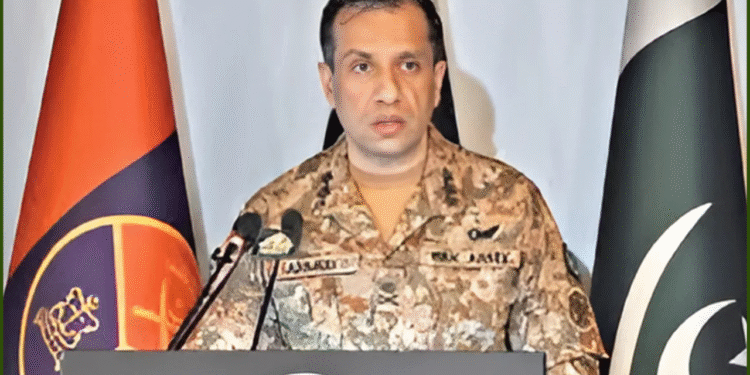Islamabad, May 9, 2025 — In a strongly worded press conference, Pakistan’s military leadership accused India of leveraging terrorism as a tool for political advantage, escalating tensions between the two nuclear-armed neighbors. The briefing, held in Islamabad, was led by Lieutenant General Ahmed Sharif Chaudhry, Director General of Inter-Services Public Relations (ISPR), alongside senior officials from the Pakistan Air Force and Navy.
Lt Gen Chaudhry alleged that India has a long-standing pattern of orchestrating incidents to vilify Pakistan and distract from its domestic challenges. “India’s playbook is clear: stage or manipulate events, point fingers at Pakistan, and use the narrative to fuel political agendas,” he stated. He cited recent violence in Indian-administered Jammu and Kashmir, particularly the Pahalgam incident, as an example of what he described as New Delhi’s “staged provocations.”
The DG ISPR reported that Pakistan has suffered significant losses due to Indian actions along the Line of Control (LoC), with 33 civilian deaths and 62 injuries. “Every life lost weighs heavily on us, and Pakistan remains resolute in seeking justice,” he said, emphasizing the armed forces’ commitment to protecting national sovereignty.
Rejecting Indian Claims
Pakistan’s military categorically denied Indian allegations linking Pakistan to the Pahalgam attack, calling them “baseless and hasty.” Lt Gen Chaudhry questioned the credibility of India’s rapid identification of alleged perpetrators, noting that such claims were made within minutes of the incident. “This rush to judgment without evidence is a hallmark of India’s disinformation campaign,” he said.
To counter these accusations, Pakistan has proposed an independent, third-party investigation into the incident, an offer that India has yet to accept. “If India is confident in its narrative, why shy away from transparency?” the DG ISPR challenged.
Allegations of Indian-Sponsored Terrorism
The press conference also highlighted Pakistan’s claims of India’s involvement in cross-border terrorism. Lt Gen Chaudhry accused India of funding and supporting militant groups, including those operating in Pakistan’s Balochistan province and beyond. “Evidence points to Indian-backed terror networks not only in Pakistan but also in other countries,” he said, referencing recent diplomatic frictions between India and Canada over similar concerns.
He further alleged that India is providing safe havens to terrorist outfits, including groups Pakistan refers to as “Fitna al Khawarij,” a term used for the banned Tehreek-i-Taliban Pakistan (TTP). “The international community must hold India accountable for its role in destabilizing the region,” he urged.
LoC Tensions and Civilian Targeting
The briefing addressed ongoing clashes along the LoC, where Pakistan accuses Indian forces of targeting civilian populations. Lt Gen Chaudhry clarified that Pakistan’s retaliatory measures have been confined to military targets, refuting Indian claims of drone or rocket attacks. “If India has proof of such actions, let it be presented to the world,” he said, dismissing Indian media reports as “propaganda.”
He condemned India’s alleged targeting of women and children in border areas, calling it a violation of international norms. “Pakistan seeks peace, but we will not tolerate aggression against our people,” he warned.
Voices from Kashmir
The military presented testimonies from residents of Indian-administered Jammu and Kashmir, who expressed skepticism about their government’s handling of recent security incidents. These individuals, according to Lt Gen Chaudhry, described the Pahalgam attack as a possible “inside job” meant to bolster India’s narrative against Pakistan.
A Call for Peace and Accountability
While reaffirming Pakistan’s desire for regional stability, the military leadership cautioned that continued provocations could have severe consequences. “Pakistan has shown restraint, but our patience has limits,” said Air Vice Marshal Aurangzeb Ahmed, who emphasized the Pakistan Air Force’s readiness to respond to any escalation.
Rear Admiral Raja Rab Nawaz, representing the Navy, underscored the broader implications of India’s actions, warning that they threaten maritime security in the region. “Pakistan’s armed forces are united in defending our land, air, and sea,” he said.
The press conference concluded with a renewed call for international intervention to address India’s alleged transgressions. “The world cannot ignore the risks of India’s reckless policies,” Lt Gen Chaudhry said, urging global powers to promote dialogue and de-escalation.
As tensions simmer, Pakistan’s military remains on high alert, signaling that any further aggression will be met with a firm response. The situation along the LoC continues to evolve, with both nations trading accusations amid growing concerns over regional stability.

















































